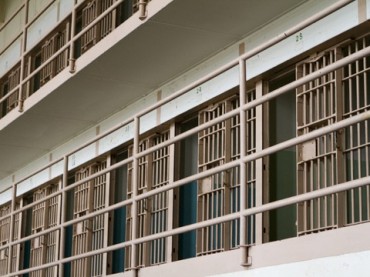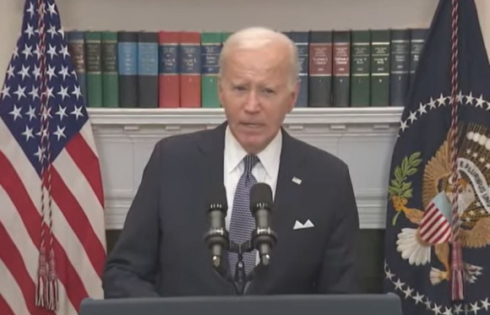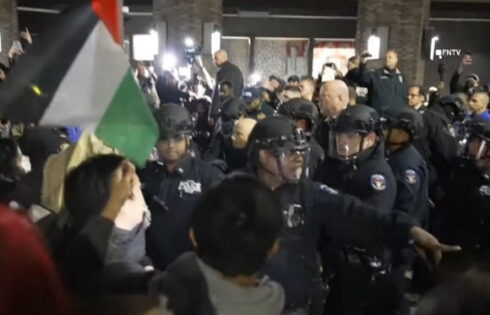
The reason black and Latino men are incarcerated at far greater rates than white men is because “institutionalized racism” is embedded in America’s criminal justice system.
That’s what Paula Ioanide, assistant professor at the Center for the Study of Culture, Race & Ethnicity at Ithaca College, argued in an extensive interview recently with The College Fix.
“The criminal justice system has always been institutionally racist,” said Dr. Ioanide, who teaches courses such as “politics of whiteness,” “punishment, prisons and democracy” and “race and sexual politics” at the private, liberal arts college in upstate New York.
“The system is racist because people who get policed, arrested, convicted, and sentenced for crimes are disproportionately African-Americans and Latinos,” she said.
“It has been consistently shown that whites commit more crimes than blacks and Latinos,” Ioanide added, noting it makes mathematical sense that white people will commit more crimes due to the fact that they represent a greater percentage of the population than people of color.
“Poor people of color, especially in black and Latino communities, are over-policed, arrested at higher rates than whites, sentenced to longer and harsher terms, and are more likely to come back into prison or jail once they’ve already been there,” she said.
What’s more, 2.3 million people are incarcerated today, while only 500,000 people were incarcerated in 1980 – and all the while the national crime rate itself has largely not changed. Why the disparity?
Ioanide said communities of color tend to be “over-policed,” because the “dominant imagination,” created through media stereotypes, is that “black and Latino people commit more crimes than whites.”
Dr. Ioanide’s professional arguments are not only shared with students, but she is also invited to speak at other colleges, and recently gave a talk at the University of California – Santa Barbara titled “Cages Are The New Plantations.”
During that talk, she likened prison to modern-day slavery.
“If we confront the fact that the economies of incarceration today echo the economies of plantation slavery and worker exploitation, will our minds be receptive?” Ioanide had asked. “And if our minds are receptive of the facts, will they carry the message to our hearts?”
A Long History
Ioanide said the situation today can be traced back to America’s roots in the aftermath of slavery. When slavery was abolished – specifically, when the Thirteenth Amendment was ratified – an important clause that often gets ignored, she said, is that slavery was abolished “except as punishment for a crime.”
The clause allowed for state-sponsored punishment to permit forms of enslavement and the use of free convict labor, for example convict leasing and the chain-gang system, she explained. And these systems overwhelmingly convicted Black people using Black Codes, she added.
Fast-forward to a few decades ago.
Ioanide cites an article called “Frontlash” by Yale Professor Vesla Weaver that argues that the civil rights movement discredited the idea of white supremacy, and a series of subsequent legislation had been focused on criminalizing populations that had become empowered through civil rights legislation.
These laws, according to Ioanide, are meant to be an increase of the state’s capacity to convict people and put them in jail. President Nixon began a “law and order” campaign in order to pass this legislation while President Reagan’s administration expanded it and funded the state entities that would police, convict, and incarcerate through the “War on Drugs,” she argues.
The War on Drugs targeted people who were perceived to be committing higher rates of crime, which most associated with poor Black and Latino neighborhoods.
Underscoring this, the economic crisis in the 1970s affected minorities in ways never seen before – largely due to globalization and a decline in manufacturing, in which many minorities lost their jobs, she said. Black and Latino men sometimes turned to drug markets in order to make ends meet, she said.
“Basically, black and Latino men are out of jobs, the media sensationalizes drug markets, and massive policing in these communities ensues,” she said.
A biased, broken system?
Her research also has found that white people tend to receive lighter sentences than people of color for the same exact crime, proving racial disparities in sentencing as well.
She said she learned about the everyday realities of incarceration through her students’ stories, as she taught a class at Auburn Correctional Facility.
She said she observed that today’s system of incarceration leaves “little room for people to be works in progress” because the so-called prison industrial complex has always been an “economy” of its own – people don’t want to do away with it because people’s jobs as correction officers, police officers, union employees and others would be affected if the state revoked its investments in mass incarceration.
College students – especially those who attend public universities – should be concerned about these policies, however, she said. When a state starts to allocate more taxpayer dollars to mass incarceration, it begins funneling less money to public universities, and universities make up for this by increasing tuition, she said.
It also means not as much money goes to social programs, including affordable housing, Medicare, Medicaid, Social Security and the like, she said.
Another issue is that the vast majority of people in county jails are awaiting trial and have not yet been convicted of a crime, and, in most cases, are “too poor to make bail,” Dr. Ioanide says.
Indeed, one’s entire life can be destroyed after six months in jail awaiting trial for a petty misdemeanor or drug crime, she said. A person can get evicted from their home, child protective services gets custody of their children – and even if they are found not guilty, their whole family and life are “fundamentally disrupted,” she said.
Dr. Ioanide said she believes people shouldn’t have to await trial or sentencing in jail for simply a “petty, small misdemeanor,” such as marijuana possession.
She noted 50 percent of Americans incarcerated today are behind bars for drug offenses, compared to just 16 percent in 1970, before the war on drugs was launched.
Who’s to blame? Everyone
Ioanide said Republican and Democrat politicians share the blame.
“There’s lots of evidence of Ronald Reagan created the war on drugs campaign because he truly believed black and Latino people were essentially criminals,” Dr. Ioanide said. “Whether he intended it or not –although research says he did intend it – he invested billions of dollars for funding militarism, increased policing, and increased surveillance.”
This gave birth to the “prison industrial complex.”
“Conservatives and liberals have consistently agreed on the policies to increase public spending on the system of mass incarceration,” she said.
She added President Barack Obama’s increase of immigrant detention also exacerbates the problem, which has spanned for decades under Republican and Democratic administrations.
“If conservatives are really serious about small government, they shouldn’t be in support of all this government money going to mass incarceration that disproportionately affects minority populations,” she said.
Today’s system is set up to continually punish people even after they leave incarceration because a criminal record is a “permanent stain” on one’s life, she said.
In fact, even Sen. Rand Paul (R-KY) echoed a similar sentiment in a recent interview, saying, “If 30 years ago you grew marijuana plants in your college dorm, you should get your right to vote back. It’s ridiculous. We have people in Kentucky who can’t vote after 30 years after they serve their time for a nonviolent crime.”
College Fix contributor Andrew Desiderio is a student at The George Washington University.
Like The College Fix on Facebook / Follow us on Twitter
IMAGE: SideOneCincy/Flickr




Please join the conversation about our stories on Facebook, Twitter, Instagram, Reddit, MeWe, Rumble, Gab, Minds and Gettr.